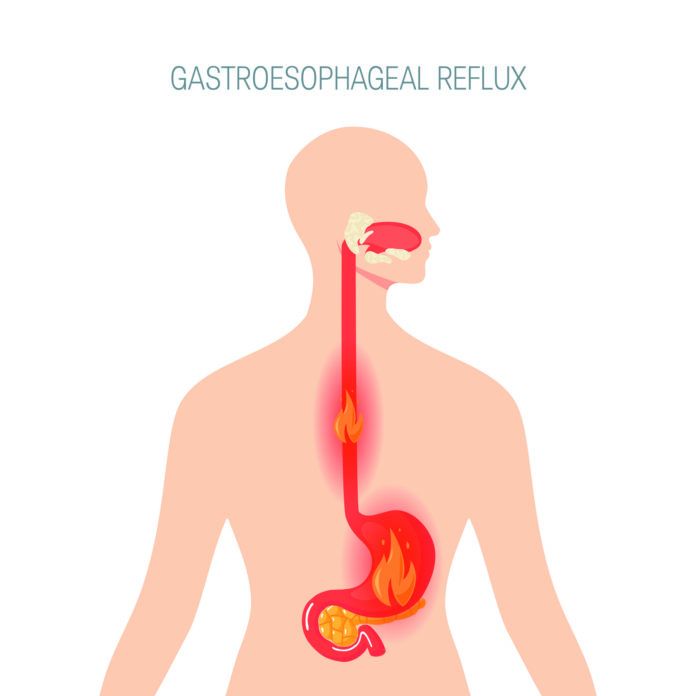It’s a safe bet that antacids have a permanent place in your medicine cabinet. That’s because more than 60 million Americans experience heartburn, also known as acid indigestion, at least once a month, and some studies suggest that 15 million Americans experience symptoms daily. While antacids and other over-the-counter medications are often the quick fix for relief of occasional symptoms, why not avoid the issue altogether? Simple diet and lifestyle changes can help you manage or avoid symptoms.
What Causes Heartburn? Heartburn is caused by acid reflux—the movement of stomach acid up into the esophagus (the tube that carries solids and liquids from the mouth into the stomach). A valve at the end of the esophagus closes when food enters the stomach. When this valve is not functioning properly, food and acid can leak back through the valve, irritating the esophageal lining and causing the symptoms of heartburn. Typical symptoms include a mild burning sensation in the chest that may move upward into the neck and throat, perhaps accompanied by a bitter, sour taste.
Heartburn is not a cause for concern when it occurs occasionally. Frequent heartburn episodes—two or more times a week—may indicate a more serious problem, such as gastroesophageal reflux disease (GERD). GERD affects about 20 percent of U.S. adults. Alicia Romano, MS, RD, LDN, CNSC, a dietitian at the Tufts Frances Stern Nutrition Center recommends anyone experiencing persistent symptoms seek medical attention. “Additional GERD symptoms, including difficulty swallowing, coughing or wheezing, and chest pain, are all signs you should seek medical attention,” she says. Untreated, GERD can damage the lining of the esophagus and increase risk for esophageal cancer.
Romano strongly advises against self-diagnosing. “Reflux symptoms can be similar to those of a heart attack,” she says. “If you feel that you are experiencing constriction or pressure, not a burning sensation, it is important to call your doctor.”
Putting Out the Fire: “Diet and lifestyle changes are often enough to minimize heartburn symptoms,” according to Romano. For basic heartburn prevention (and general gastrointestinal wellness) research supports following a high-fiber diet that is rich in vegetables, fruits, and whole grains. If you suffer from heartburn, eliminating or cutting back on common dietary triggers such as mints, spicy or greasy foods, and citrus may help (see “Potential Triggers”). Work with a Registered Dietitian or other healthcare professional to identify your personal dietary triggers and help avoid unnecessary dietary restrictions.
If you suffer from periodic heartburn, the tips in the “Take Charge!” box may be all you need to put out the fire.
Try these tips to avoid (and manage) heartburn:
- Avoid large portions and heavy meals. An over-full stomach can relax the valve of the esophagus, leading to acid reflux.
- Slow down! Chew your food well and avoid eating quickly. This slows the rate that food enters your stomach, preventing pressure build-up. It also helps you eat less.
- Loosen clothing. Tight clothing and belts can compress your stomach and force acids back into the esophagus.
- Limit well-known food triggers. Certain foods can cause symptoms by irritating the esophagus, relaxing the esophageal valve, contributing to overfullness, or increasing pressure. The specific foods vary among individuals. (See “Potential Triggers.”)
- Stop smoking. Cigarette smoke relaxes the esophageal valve and may increase the amount of acid the stomach makes.
- Practice stress reduction techniques. Stress may make heartburn worse.
- Maintain good posture. Slouching puts pressure on the abdomen, which can push acid up.
- Avoid lying down after eating. Stay upright for two to three hours after eating to allow for adequate digestion.
- Elevate your upper body when lying down. Raising the head of your bed or propping up on pillows on the couch can help prevent acid from backing up into the esophagus.
- Take a walk. A non-vigorous, 15-minute walk after meals may improve the movement of food from the stomach into the intestines.
- Reduce body weight if necessary. Excess abdominal fat may place pressure on the stomach.






















Good suggestions. I eat my main meal at lunch and have a light dinner. This helped very much. Switching to a whole food plant based diet helped, with extensive and ongoing investigation on my part to be sure my diet was and is complete. I used to have heartburn every night. Endoscopy revealing PUD and H. Pylori with appropriate treatment also was helpful. My mom had years of heartburn and died of esophageal cancer.
Gaviscon advanced should be approved by FDA. It is most effective treatment I have used. Why isn’t this mentioned?
Good info…thanks
I have heartburn 2 or 3 times a year, but what has happened weekly for the past 20 years that I throw up before bed time or in the middle of the night. mostly stomach juices and at time some a little of digested food. then I can sleep well. I used to have severe chest pains starting in the center and going towards my left shoulder. Some times twice or three times daily. Those have reduced to a few annually. I do take Omeprazol 20 mg twice a day for the past 10 years and also I also have a slight Hernia.
My GI doctors are not certain if I have GERD or Achalasia, as I can eat a reasonable size steaks and not throw up but get into trouble with large sandwich. GIs have counted out surgery and are going to try a Botox injection. Can you give me any suggestions, will be very appreciated. Thanking you in advance.